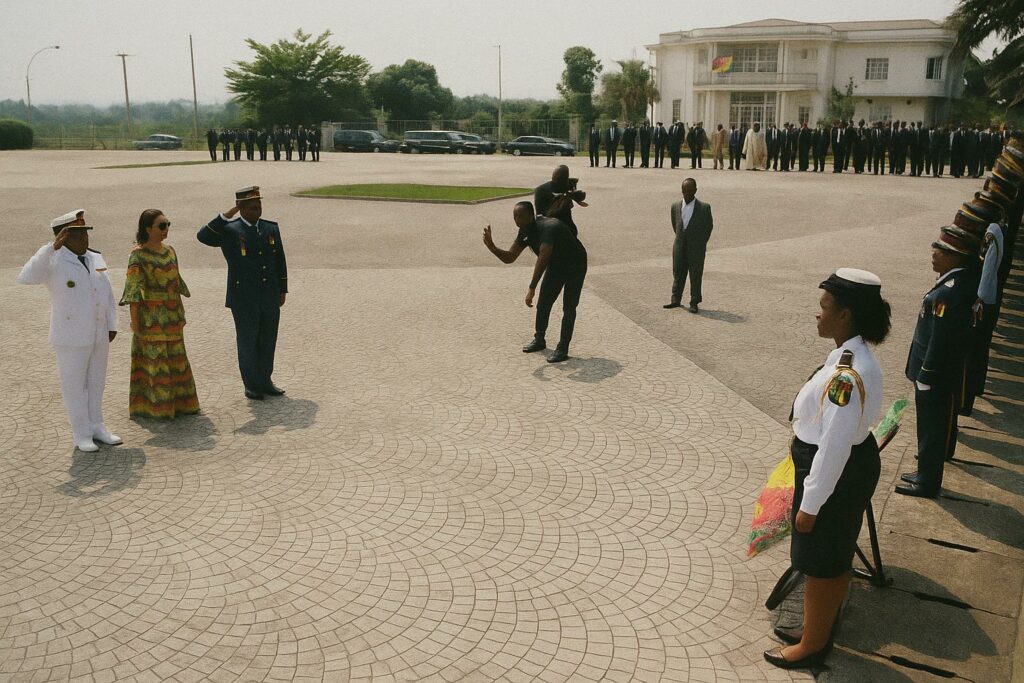Owando’s Pageantry Masks a Nation’s Strategic Anxiety
The military parade on 22 June in Owando unfolded with predictable pomp: impeccably pressed uniforms, precision drills and the ritual laying of a wreath at the Place de la République by Prefect Emma Henriette Berthe Bassinga. Yet the choice of the anniversary’s motto—“Serve with honour and devotion, protect and defend with rigour”—betrayed an undercurrent of urgency. Captain Misère Dieudonné Okana, commander of Defence Zone No. 4, used the occasion to warn his officers that “the profession of arms is a vocation of sacrifice.” His admonition was less rhetorical flourish than a thinly veiled reminder that Congo’s security landscape remains febrile, shaped by porous borders with the Central African Republic and the Democratic Republic of Congo, where rebel traffic and arms smuggling have not abated (International Crisis Group 2023).
From 1960 Independence to 2024: A Condensed Military Trajectory
Created in the immediate post-independence period of 1960, the Forces armées congolaises (FAC) and the Gendarmerie nationale have oscillated between politicisation and professionalisation. Episodes of military involvement in politics—most notably the 1997 civil war—eroded public trust and prompted successive governments to pledge reform. While a 2018 defence white paper promised modernisation through better training and equipment, budgetary execution has lagged amid fluctuating oil revenues, which still fund over 60 percent of national expenditure (African Development Bank 2024). The Owando festivities thus served as a reminder that institutional longevity is not synonymous with institutional transformation.
Election Countdown: 2026 as a Security Stress Test
Captain Okana’s explicit reference to the 2026 electoral cycle signalled an awareness that political contestation, rather than conventional warfare, may constitute the armed forces’ most immediate challenge. In the 2016 polls, pre-electoral tension triggered localised clashes in Pool province; observers from the Centre for Humanitarian Dialogue recorded at least 17 fatalities. Civil society groups, including the Congolese Observatory of Human Rights, now press for clearer rules of engagement and stronger parliamentary oversight to prevent a repetition. The Ministry of Defence has responded by drafting a code of conduct for election security, expected to be tabled before the National Assembly later this year, though critics argue that without concomitant budget allocations for community policing the document risks remaining aspirational.
An Unlikely Pulpit: Ecclesiastical Mediation in Civil–Military Relations
The ecumenical service held at Owando’s Église évangélique du Congo may appear peripheral, yet in a polity where religious institutions often fill governance gaps, the pastor’s plea for humility was politically resonant. Drawing on the biblical washing of feet, Reverend Serge Mourrath admonished officers to embrace servant leadership. According to researchers at the Kofi Annan International Peacekeeping Training Centre, clerical interlocutors have historically facilitated dialogue during Congo’s internecine crises, a soft-power tradition the government tacitly endorses. The armed forces’ public engagement with faith groups thus doubles as an exercise in legitimacy-building.
Sport, Symbolism and the Quest for Cohesion
Beyond sermons and salutes, the anniversary programme featured football, volley-ball and marksmanship contests. Such seemingly apolitical events serve a dual purpose: fostering esprit de corps internally while projecting an image of disciplined normalcy externally. Defence sociologist Marie-Claude Tseka notes that athletic competition mitigates inter-branch rivalries that, if unaddressed, can undermine operational coherence. Nonetheless, morale-boosting spectacles cannot fully substitute for modern logistics or timely salaries—structural deficiencies repeatedly flagged in United Nations Panel of Experts reports on Central Africa.
Between Ceremony and Capability: The Road Ahead
Owando’s 64th-anniversary tableau offered a microcosm of Congo’s broader security dilemma: impressive ceremonial continuity juxtaposed with the unfinished business of reform. The symbolism of wreaths and sermons resonated with national pride, yet analysts from the Stockholm International Peace Research Institute warn that regional threat matrices evolve faster than Brazzaville’s procurement cycles. As the 2026 elections loom, the measure of the armed forces will hinge not on choreography but on the capacity to provide impartial, rights-respecting security. In Captain Okana’s own words, the vocation is a ‘sacrifice’; whether the institution can translate that ethos into robust, accountable governance remains the pivotal question.

